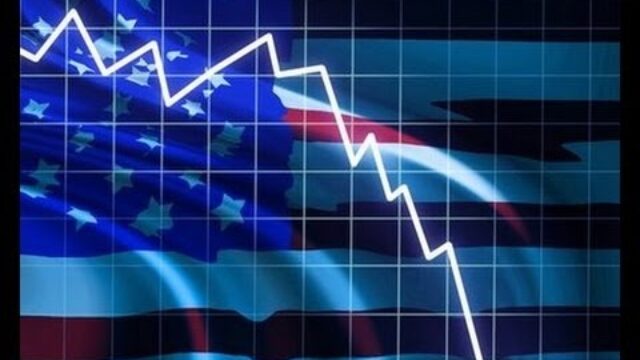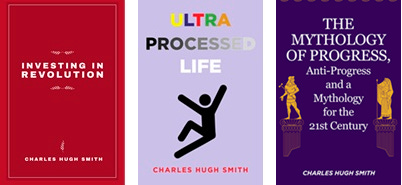The Revolution Trilogy

The research I’ve done over the past three years has changed my mind about the potential for a social revolution in the United States. Where I once considered it unlikely, I now consider it inevitable. I’ve laid out the evidence and reasoning supporting this conclusion in three books which I call The Revolution Trilogy:
The Mythology of Progress
Ultra-Processed Life
Investing In Revolution. (#1 New Release in Social Philosophy)

The dominant mythology of the modern era is technology-driven Progress, which is viewed as an inherently positive unstoppable force of nature: technological advances inevitably improve our lives.
Calling this a belief system / mythology triggers indignant outrage: this is scientific fact, not belief. But the claim that technology is always positive and Progress is inevitable is not actually scientific; the claim is based on projecting the history of the Hydrocarbon Age (the past 200 years), not science.
But since technology/science are the foundations of Progress, the mythology demands that we believe Progress and science are one in the same.
One of main themes in my book is how Progress transitioned from public infrastructure providing obvious benefits–clean water, waste disposal systems, electrification, railways, bridges, highways and so on–to consumerist definitions of Progress: buy and own the latest innovative product/service.
Once those who could afford consumerist gadgets had bought them, a problem emerged: how do we increase profits if everyone already has one of our gadgets? Population growth helped, but once Progress was harnessed for profit, fashion became the driver of consumption, not need.
But once the purchasing power of wages began stagnating in the 1970s, fashion was no longer enough to drive sales and profits. Consumer credit filled the gap left by eroding wages.
In the past decade, neither fashion nor credit were sufficient to keep expanding profits, so Progress flipped polarity and became Anti-Progress: corporations obsoleted products by design and began reducing the quality of goods and services to drive customers to “upgrade” to more profitable options, a process Cory Doctorow has labeled insh*tification.
Anti-Progress has now been normalized: durability has declined, costs have soared, and the quality of life has eroded: we’re less healthy, more stressed, and our financial security is more precarious as the economy now depends on credit-asset bubbles generating “the wealth effect” that “trickles down” to the bottom 90%.
Consider AI, which is the latest technology that’s being glorified as inherently positive. It may well make a few people incredibly wealthy, but whether it actually improves the quality of life for the majority is a very open question:
1. The security of AI chatbots is Swiss cheese.
2. AI undermines real learning / education.
3. AI Slop is taking over the web.
4. AI tools con / defraud individuals.
5. AI fraud is unlimited–fake songs by real artists, deepfakes, AI designed ransomware, the list is endless.
8. AI psychosis–AI chatbots are addictive and destructive to mental health.
7. AI agents degrade already poor services.
8. AI data centers are squandering capital, water and electricity on a vast scale.
In summary: Progress is easy to define in real-world terms: life gets easier, safer and more secure. None of these describe the present: for the majority of people, life is getting harder and less secure. This is Anti-Progress, not Progress.
The top 10% who have benefited from credit-asset bubbles and globalization dominate the media, both legacy and social-alt media. Since they’re doing splendidly, they naturally proclaim the system is working grandly and Progress is amazing. There is always some advance to tout that “proves” it’s onward and upward for everyone: a new medical treatment, a new promise of energy so cheap we won’t even meter it, and so on.
Whether these promises pan out–do they scale? Are they affordable? What are the downstream costs and consequences?–is immaterial: what matters is there is a steady stream of promises in support of the mythology.
The mythology of Progress implicitly includes a social contract element: Progress must be available to all, not just an elite. But Progress is now the preserve of the top 10%, who inhabit a different world than the bottom 90%, a world far removed from the one inhabited by the bottom 60%–200 million Americans.
The mythology of Progress also implicitly claims that technology will automatically fix whatever technology has broken. Yet when it comes to the biosphere, this is visibly untrue. The Waste is Growth Landfill Economy can’t be made immortal by technology; eternally expanding consumption as the means of eternally expanding profits is disconnected from both the natural world and the authentic sources of human happiness.
The mythology of Progress no longer maps the world we experience, and so it will be abandoned and replaced with another mythology that has explicit social characteristics: claiming technology is always positive no longer maps our lived experience.
Ultra-Processed Life discusses the other lived reality that people feel but have difficulty articulating: authenticity has been replaced with artifice throughout the economy and society. Authors Guy Debord (The Society of the Spectacle, 1967) and Daniel Boorstin (The Image: A Guide to Pseudo-events in America, 1962) both addressed this process in the 1960s, but in the Internet Age, the substitution of artifice has expanded to become the dominant realm of experience. It has become so normalized we’re no longer aware of what’s been hollowed out or lost.
Both authors describe this dynamic: as the authentic, real world becomes increasingly difficult to manage (or manipulate to serve powerful interests), then those with the power to do so seek to replace authentic experiences with simulations that they can control as they are fundamentally artifices. The consumerist Waste Is Growth Landfill Economy has profitably replaced authentic identity defined by ‘doing’ with an artificial selfhood defined by buying products, services and prefabricated experiences.
Ultra-processed foods are the metaphor for the entirety of Ultra-Processed Life: engineered to be tasty but malnourishing. Once ultra-processed foods have been normalized, we no longer have a memory of what real food tastes like–or if we do, it’s less appealing that the ultra-processed snacks packed with sweeteners, salt and low-quality fats.
Investing In Revolution explores how this process of normalizing extremes has dulled our awareness of the artifice, derangement and precarity of everyday life, and how inequality, artifice and precarity have pushed the pendulum to an extreme that will succumb to gravity and swing to the opposite extreme.
This process is non-linear and emergent, and not predictable in timing, scale or trajectory. But the distortions are now so extreme they cannot endure, and a spark somewhere will ignite a conflagration.
Normalization of extremes doesn’t eradicate the consequences of extremes; it only masks them.
It’s impossible to predict what grain of sand will trigger an avalanche, but just as individuals pushed to their limits burn out and cease functioning, societies pushed to their limits break down and cease functioning.
Based on the extremes of distortion and what’s already breaking down beneath the surface, I don’t see how we can get beyond 2032-33 without a society-wide convulsion of some kind.
Our choice is where do we invest our time, effort, skills and capital to guide this disorderly reversal into a positive transformation of an unsustainable, morally decayed system that serves the few at the expense of the many into one that sustainably serves the common interests of the many rather than the private gains of the few.
https://charleshughsmith.substack.com/p/the-revolution-trilogy
